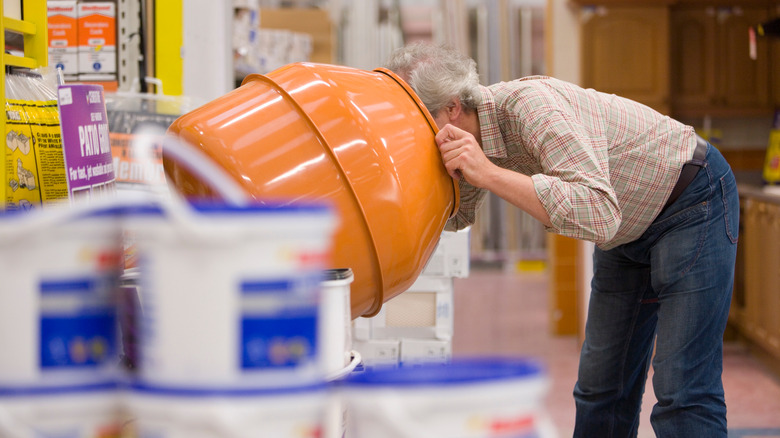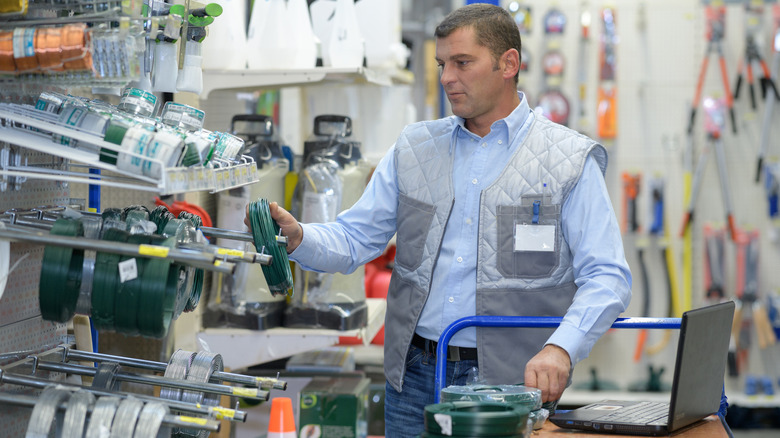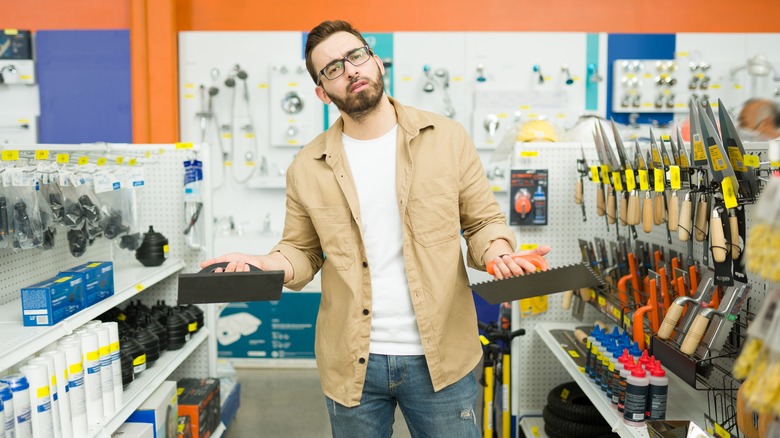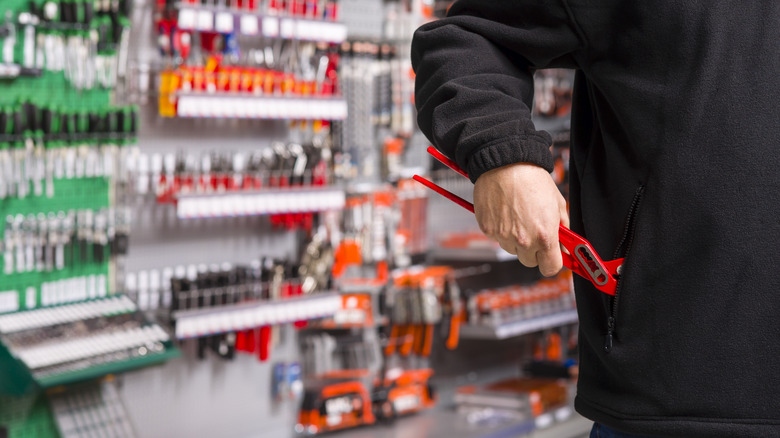Cringy Things To Avoid Doing When Shopping In A Home Improvement Store
Home Depot, just one of the major home improvement big box store chains, reports conducting 1.8 billion customer transactions annually. If one percent of those transactions involve someone acting in a way that makes someone squirm in sympathetic embarrassment or anger, that's 1,800,000 cringe-worthy experiences a year... and that's probably low-balling it. Time to get a handle on our home improvement store behavior, people.
You're not going to get any guidance from the stores themselves. You can find rules for employees, In-Store Service Groups (ISSG), Product Vendor Directs (PVD), and the company as a whole. But. understandably, they don't publish codes of conduct for customers outside of what can be inferred from pandemic-related policies and the existence of "social distancing ambassadors," as described by Motley Fool. Neither Lowe's, Home Depot, nor Menards even publishes dog policies online, and they certainly don't make public pronouncements about politeness. For this guidance, we turn to our values, common sense, and common practices.
Don't go to the hardware store for milk
You might not have heard this proverb before, and it's usually used as a metaphorical warning against expecting the wrong things in relationships. But like many proverbs, it contains some literal truth as well. "Don't go to the hardware store for milk" can be expanded to mean that you literally shouldn't, and that even if the hardware store sells it, you'll be better off buying it elsewhere. Just because Home Depot (apparently) sells kayaks doesn't make it the right place to buy a kayak.
Stuart at ToolGuyd wrote a "tongue-in-cheek" sendup of home improvement store press coverage that includes a silly bit about the fact that Lowe's doesn't sell pillows, dress socks, apples, and other ridiculous notions. But it would take about three minutes, and a glass of bourbon to kill the pain, to find a Lowe's employee on Reddit who has been asked for equally weird products. The stores don't do themselves any favors in this regard by selling popcorn carts, kids' water skis, $3,300 vibration platforms, or cowboy costumes for your cat that feature what appears to be a Russian army winter ushanka hat.
So if you find yourself at a home improvement store looking for hair rollers, the absurdity isn't entirely your fault. But if you're sensitive to eye-rolling customer service employees, maybe try a more general big box store instead.
Don't fail to do your homework
The last thing a big box employee expects is to deal with a bunch of experts. But it's still common and frustrating to deal with customers who need a thing but are unclear about what it does, what it looks like, and how big it is. This problem is not unusual in retail, but it can be particularly tricky for businesses that serve two types of customers with different levels of product knowledge. "Our goal is to help both professional contractors and average consumers solve problems," former Home Depot Chief Marketing Officer Kevin Hoffman told AdWeek. But they don't have the same problems.
The solution is to do your homework in advance. If your washer's "blue water thingy" is leaking, try consulting a diagram of washing machines to properly identify the water solenoid valve you're looking for. And take a moment to measure whatever it is that you need. Stores can offer you guidance in advance for measuring things like blinds (via Lowe's) and appliances (via Home Depot). And when it comes to nuts and bolts, try to bring in an example of what you're looking for. The fastener aisle will have thread gauges to help you identify the right size. And buy the right screw length or you might destroy whatever you're working on.
Check stock in advance and use the store's mobile app to try to find the product yourself. Both Lowe's and Home Depot have reasonably good product locators in their apps. Now, bear in mind that this won't always work. We recently tried to purchase four products from Home Depot to review, all of which were supposed to be in stock. Only one was. But at least when you finally ask for help, you'll be able to explain all this and probably buy yourself some sympathetic cooperation.
Don't assume an employee isn't helping someone already
Lots of cringe is born of our need for help... and our failure to ask for it. And we get frustrated when we can't find help. As we said above, the thing about home improvement big box stores is that most of the customers are wading into areas formerly the exclusive domain of tradespeople. The casual DIYers don't fully know what they're doing, and they need help. So when you see an employee followed closely behind by another customer, you can assume the employee is already assisting someone.
Especially with post-pandemic staffing levels, promises like Lowe's claim to "relentlessly focus on the customer" are a bit overstated. But they do usually try, and there's a pretty good chance they're trying for someone else when you decide you need their help. If a Home Depot employee is really spending six hours of an eight-hour shift helping customers directly (via Wonder), you have a 75 percent chance of finding an employee who is otherwise engaged.
The best practice is to make eye contact and then stand silently at a respectful distance until they're done. There's nothing wrong with saying something like "when you're free, I have a couple of questions," but it's usually not necessary. You can usually expect that there'll be a bit of walking around involved. Don't be shy about following the employee and customer, so long as you remember to keep your distance and stay friendly and patient.
Don't assume everyone is an employee
But when you do find someone who's not already engaged in helping a customer, take a moment to look for some clues about whether that person is actually an employee. Sometimes people wear orange or blue, and it's possible that the occasional person wears a red vest. They might not be actual employees, and even if they are, they might not be the best people to ask your question.
At Lowe's, for example, you can always expect some level of help from someone in a red vest who isn't just dressed up for a Christmas party. But a Lowe's employee in a blue shirt is usually a member of a Merchandising Service Team (MST), and while MSTs will sometimes help customers, it doesn't seem to be among their listed job responsibilities (via Lowe's). Lowe's' language about MST responsibilities is slippery in a way that probably isn't accidental. When a job listing says that a MST associate will "help customers find the right products consistently, quickly, and easily," it most likely means they'll set things up so that customers can find the products themselves. You'll be improving your odds of getting useful help by skipping the MST and seeking out a red vest.
There are others walking around with clipboards or products who appear to be working at home improvement stores. But they don't necessarily work for those stores, and there's a good chance they're with vendor employees or teams of contractors retained for specific tasks but not trained for customer service.
Don't scale the shelving for overstock
Lots of people circumvent the safety measures in home improvement stores... moving aisle blockers, removing the "lumber retention poles" that keep lumber from falling on people, etc. But if you have any sense at all, you'll let the employees pull down overstock items for you. Even if you don't fall, stuff could fall on you, according to a Home Depot employee training presentation.
Sure, it seems like you'd have no problem walking up the rolling staircase that employees use. It is a staircase, after all, and is probably less slippery than the one you have at home. But Lowe's, for example, doesn't even let vendors use those ladders, for reasons best understood by insurance actuaries. And, sure, that ¼-20 thumb screw you can't find is right there in the overstock, so why not just hop up on a shelf and reach for it? Well, the best-case scenario is that you'll get kicked out of the store. The worst case is that you'll die, which is why vendors who are allowed to climb the shelves do this while tethered by industrial climbing gear (via LowesLink).
Even if you show up with a climbing harness, chalk bag, and funny shoes, a manager is still going to eject you because, to her, you're just another lawsuit with a Spider-Man obsession. Cut it out.
Don't hesitate to ask for help
But the truth is that many people simply don't ask for help when they need it. The Anthroware blog posits a couple of possible reasons for this: people don't want help, don't want to ask for help, can't find anyone to ask, or aren't sure what questions to ask. Larry Hagner has some (seven in fact) ideas about why this is a particular problem for men (via The Dad Edge). But underneath the psychologizing and theorizing, it all boils down to Hagner's first explanation: we think we can do it without help.
All of these explanations ignore another possibility that's too real to ignore: Sometimes we just don't trust the employees who try to help us. It's always possible that a big box employee doesn't know any more than you do, and if you've been working on your home for a few years, it's fairly likely, which makes asking for help a frustrating waste of time. You might be subjected to a sales pitch instead of actual helpful advice, or you might get bad advice (via Lifehacker).
The downstream effects of this can be disastrous: You buy the wrong thing and your project is stalled, or you install the wrong thing, and your house floods. You absolutely have to get over it and try finding help.
If you're suspicious about the person's competence, listen carefully for clues to the employee's level of experience and confidence. Be humble because you don't know what you're doing either, and say so. Commiserating about your cluelessness will make it easier to ask for a second opinion, as in: "Yeah, I don't have any idea about this kind of stuff either. Be lucky if I don't flood my house. Wasn't there a woman in this department who was a retired plumber? Is she around today, by any chance?"
Don't just stand there when someone needs help
If you see someone struggling (remember, most of these folks have only the vaguest idea of what they're doing), offer to help. An elderly person bewildered by the smart doorbell section, a guy trying to load unwieldy, 60-lb. sheets of plywood into his truck, a young couple who doesn't understand toilet supply line connectors (who does?) but can't find help. These are all people you can try to help. You might be told to mind your own business from time to time, but how likely is that, really? Ask a dozen people you know if they've ever gotten that reaction from a sincere attempt to help. It's pretty rare, right?
Offering to help with a physical task is a no-brainer. Even the strongest construction worker would rather be doing something other than loading 100 4x4s onto a trailer; he was just too stubborn to ask for help in the store.
Giving advice is a different thing, and implies that you know what you're doing. In fact, you're taking the place of the store personnel in this situation, so you have to be honest about your knowledge level and experience. But if you can help, then help. Even if you're not a subject-matter expert, you can still help by pointing people to informative resources like apps, live chat, online reviews, and digital advisors/product finders (via Zoovu).
Don't complain about prices
Complaints are like a competitive sport for some people who feel like the entire world is in their debt. They will be loud, confident, and wrong, and they will often win, because of the absurd idea that the customer is always right. Which is part of why they keep doing it. Don't be that person. Everything on Earth is more complicated than it needs to be, and that's not the fault of the person standing in front of you. All complaining does is add to the chaos without increasing the likelihood of resolution.
But, to be fair, it's hard to walk into a store without finding something that's legitimately complaint-worthy. If you've been legitimately wronged or have witnessed an unacceptable injustice, tell your story to a manager or write a scathing review. Otherwise, hold your tongue. But if you really feel the need to pursue justice in a conversation with an hourly employee, ask for a discount instead. That might also feel cringe-worthy, but do it anyway because it works. The potential discount is at the discretion of the employee, says Insider, so if you need a reason to be polite, there's one.
Consumer Reports recently surveyed 38,000 members about 56,000 appliance purchases and found that two-thirds of those who asked received a discount, saving a median of $119. At Lowe's and Home Depot, the success rate was even better (64 and 61 percent, respectively). Lowe's customers in particular benefited, with an average savings of $120 (via Consumer Reports).
Don't complain that some items are locked up
While you're not complaining, go ahead and don't complain about waiting for an associate to unlock the battery-powered tools for you. It's sort of natural to feel like you're paying for others' misdeeds in this situation, but the truth is that you're doing the opposite: Preventing theft will hold your actual prices down, compared with rampant (and sometimes criminally organized) shoplifting.
The National Retail Federation's Organized Retail Crime report for 2020 (the last year before COVID rejiggered retail restructured theft) shows that for every $1 billion in sales, retailers lose $719,548 to theft by organized crime. We're not talking about the mafia here, but ordinary people stealing in an organized fashion with a team. It might be easy enough to pick out some of Tony Soprano's guys, but you'd have a hard time profiling Alexis and Ronald Dattadeen, an ordinary couple of parents who started a massive baby formula theft ring in Florida (via the New York Times).
Learning to love the locked-up products is not just about making up that $719 large by paying higher prices. Theft is also one of the main reasons store stock counts are never accurate, so you end up standing there looking at an empty shelf and trying to come up with Plan B (via Lifehacker).
Don't leave unwanted stuff everywhere (except tape measures)
The reasoning goes something like this: This store pays people to keep the stock in order, so I'm probably helping someone to stay employed by sticking this hammer on a shelf in the lighting section. That's getting cause and effect backward, and you have better options.
If you want to see why it matters, spend a few minutes in the drawers of "hard-to-find" specialty fasteners. Apparently, people don't think they're hard enough to find, because approximately 100 percent of customers don't put things back in the right place. Short of starting foundations to fight blindness and illiteracy, your best option is to not do this. Ever. At all.
Some sections actually have places for customers to dump products they've decided against, borrowing libraries' idea that everyone's better off if the pros put things back where they belong. It's one thing to fail to locate a copy of Sylvia Plath's Letters About Toothbrushes, but it's a few orders of magnitude worse when you can't find the right toilet supply line coupling.
The very pleasant but somewhat intimidating people at Treadmill Reviews conducted some fairly legit research about grocery store etiquette, and found that 79 percent of people think putting non-perishables anywhere but where you got them is wrong. (96 percent found this to be true of handling perishables, leaving 4 percent who maybe thought "perishables" was a misspelling of "parasols.")
The one exception: tape measures. These should already be on every aisle of any hardware store already. This includes the lumber section where the size of everything is marked, because many people don't know nominal sizes from nominating conventions. So if you happen to lay a tape measure down where you and 5,000 other people needed it before, don't sweat it.










